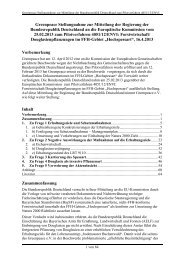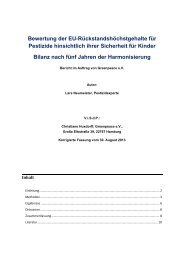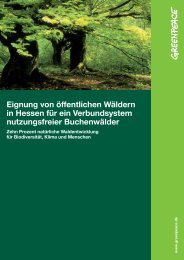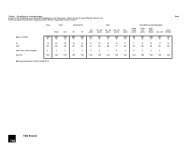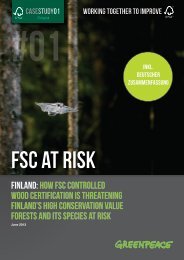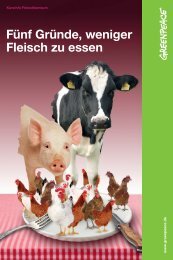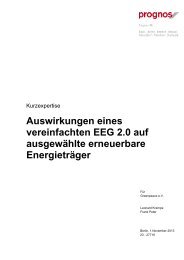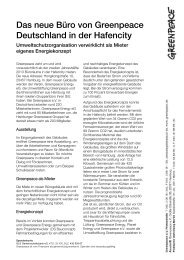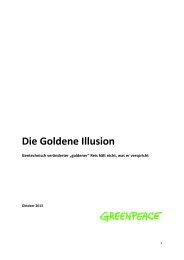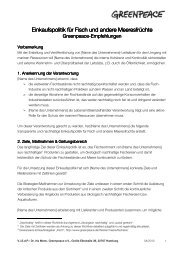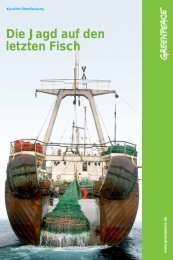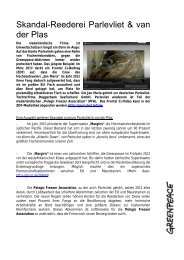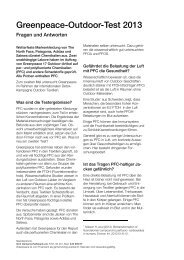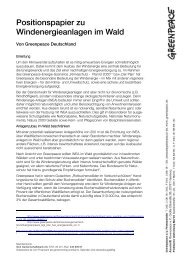HOW THE PALM OIL INDUSTRY IS - Greenpeace
HOW THE PALM OIL INDUSTRY IS - Greenpeace
HOW THE PALM OIL INDUSTRY IS - Greenpeace
Create successful ePaper yourself
Turn your PDF publications into a flip-book with our unique Google optimized e-Paper software.
DUTA <strong>PALM</strong>A: <strong>THE</strong> <strong>OIL</strong><br />
<strong>PALM</strong> <strong>INDUSTRY</strong>’S RECIPE<br />
FOR CLIMATE D<strong>IS</strong>ASTER<br />
The privately-held Duta Palma group is a company with<br />
major operations in Riau. It is one of Indonesia’s tenlargest<br />
palm oil refiners.<br />
Duta Palma now controls about 200,000 hectares<br />
of land, over half of it in Riau. This landbank overlaps<br />
significant areas of deep peat, which are theoretically<br />
protected under Indonesian law.<br />
<strong>Greenpeace</strong> analysed satellite data from the period<br />
2001-2007. This showed significant forest clearance<br />
within several of Duta Palma’s contiguous concessions<br />
in Riau. According to official maps, nearly half of the total<br />
area of the concessions is on peatlands with a depth<br />
greater than 2 metres. One area is officially designated<br />
as protected peatlands, ie more than 3 metres deep.<br />
Measurements made by <strong>Greenpeace</strong> of the peat<br />
depth in October 2007 show that the concessions lie<br />
on very deep strata of peat ranging from 3.5 metres<br />
in depth outside the boundary of the concession to<br />
more than 8 metres in the middle of the concession<br />
area. Therefore, the entire area should be protected<br />
under Indonesian law.<br />
Additional field investigations by <strong>Greenpeace</strong> confirms<br />
extensive peat drainage, including construction of large<br />
canals, and clear-cutting of rainforests is happening across<br />
these concessions.<br />
Duta Palma is also involved in the destruction of habitat<br />
critical to endangered and protected species including the<br />
critically endangered Sumatran tiger.<br />
WHO CONTROLS<br />
<strong>THE</strong> TRADE?<br />
Roundtable on<br />
Sustainable Palm Oil<br />
The Roundtable on Sustainable Palm Oil (RSPO) is a high<br />
profile initiative chaired by Unilever. Its members include<br />
major companies along the supply chain from plantations<br />
through to commodities traders, including Cargill and<br />
ADM, to the world’s food giants, including Cadbury’s,<br />
Nestlé and Tesco. Together they represent 40% of the<br />
global production and use of palm oil.<br />
On-the-ground investigations by <strong>Greenpeace</strong> reveal<br />
that RSPO members are dependent on suppliers<br />
that are actively engaged in deforestation and the<br />
conversion of peatlands.<br />
the food giants<br />
The RSPO board president Unilever is a major player<br />
in the global palm oil trade. It uses around 1.2 million<br />
tonnes of palm oil every year , or about 3% of total world<br />
palm oil production, most of which originates from<br />
Indonesia and Malaysia. It uses palm oil in brands such<br />
as Flora margarine.<br />
Other leading brands including KitKat, Pringles,<br />
Philadelphia cream cheese and Cadbury’s Flake and<br />
leading companies including Gillette, Burger King and<br />
McCain are complicit in the expansion of palm oil at the<br />
expense of Indonesia’s peatlands.<br />
the commodity giants<br />
Much of the global trade in Indonesian palm oil is<br />
handled by traders based in Singapore. Some of the<br />
largest Singapore-based commodity traders are RSPO<br />
members, including the ADM-Kuok-Wilmar alliance,<br />
Cargill, Golden Hope and Sinar Mas.<br />
The traders are also processors, blending palm oil which<br />
originates from deforestation and peatland destruction<br />
through their refineries and biofuel facilities.<br />
The companies’ control over the entire palm oil supply<br />
chain – from plantations in Indonesia to refined palm oil<br />
or biofuel – means that they are in a decisive position to<br />
affect and change the market.<br />
One RSPO member, a major food retailer, has<br />
complained to <strong>Greenpeace</strong> that efforts towards<br />
sustainability are hampered because: ‘…the global<br />
palm oil industry is unable at present to provide anyone<br />
with evidence of traceability beyond processor, to<br />
plantation level’.<br />
Consequently, consumer companies who manufacture<br />
products using palm oil have virtually no way of knowing<br />
whether or not the palm oil they are using is from rainforest<br />
destruction and conversion of peatlands.<br />
Through carrying on business as usual, the commodity<br />
trade and other big players are not taking the urgent action<br />
necessary to abandon destructive and socially unjust<br />
practices linked to the industry’s expansion.



